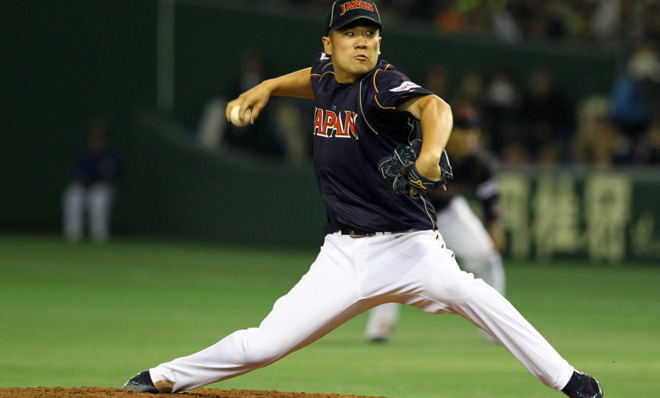Meet the opt-out clause: A baseball player's best friend
Masahiro Tanaka is just the latest player who could double-dip his mega-deal


A free daily email with the biggest news stories of the day – and the best features from TheWeek.com
You are now subscribed
Your newsletter sign-up was successful
The Masahiro Tanaka sweepstakes is over, as the prized Japanese pitcher has agreed to a massive seven-year, $155 million contract with — who else — the Yankees.
Even though Tanaka has never thrown a single pitch in the major leagues, the Yankees are guaranteeing him the fifth-largest contract ever for a free agent hurler. It is, quite simply, a bonkers contract.
The deal does come with an interesting catch, though: Tanaka can opt out of the agreement after the fourth year. And in that sense, there's a good chance the deal will actually wind up as something more like a four-year, $88 million contract. That's still a huge sum of money — and it would likely put Tanaka in line for an even bigger pay day.
The Week
Escape your echo chamber. Get the facts behind the news, plus analysis from multiple perspectives.

Sign up for The Week's Free Newsletters
From our morning news briefing to a weekly Good News Newsletter, get the best of The Week delivered directly to your inbox.
From our morning news briefing to a weekly Good News Newsletter, get the best of The Week delivered directly to your inbox.
So what is an opt-out clause? As the name suggests, it's a contractual escape hatch that lets players who feel like they could get better deals on the open market hit free agency early to test that hypothesis. And in recent years, more and more players have been inking deals with such provisions.
To be sure, the opt-out clause isn't a totally new idea. The most famous such clause is probably the one in Alex Rodriguez's first blockbuster deal, back in 2000. That clause let Rodriguez bail on the then-biggest contract in baseball history to sign the now-biggest contract in baseball history.
See: The provision works.
In a recent phenomenon though, teams have begun to shift away from free agency spending sprees — what with their high costs and higher stakes — to instead lock up their own young talent on lengthy deals. Clayton Kershaw, among others, just got a record payday for that very reason. It's a general realization by teams that hurling sacks of money at over-the-hill free agents isn't as effective as paying the same premium for younger, home-grown pieces.
A free daily email with the biggest news stories of the day – and the best features from TheWeek.com
What that means is that more players are signing long-term deals while still in their early- or mid-twenties. Tanaka and Kershaw are 25; Texas' Elvis Andrus was 24 last year when he signed an eight-year deal — with an opt-out clause that could trim it to four years.
That trend and the rise of the opt-out go hand in hand. Players who sign long-term deals before peaking understandably want to maximize their value, and the best way to do that is to sign a couple of big contracts before they begin to decline.
Enter the opt-out.
If a star player meets or exceeds expectations, he can opt out while still in his prime. Since there will always be some team willing to shell out big money for a top-tier free agent, said player could land a second mammoth deal, essentially replacing the final couple years of his old contract with even more years and more money on a new one.
In A-Rod's case, that meant skipping the final $81 million and three years of one contract in favor of 10 years and $275 million on a new one. Sure it's an extreme case, and one that didn't work out so well in the end for New York, but in that sense, it exemplifies why players love the idea of the opt-out.
Returning to Tanaka, he could opt out at 29 years old, when he'll have three years and $67 million left on his deal. If he lives up to expectations over the course of his current contract, there's no way he wouldn't find a better deal than 3/$67 in free agency, especially considering the fire hose of TV money baseball just turned on.
And if Tanaka fails? Well, he can always do what Vernon Wells did: Decline the opt-out and ride out his deal as one of the most overpaid players in the game.
It's a win-win for players: Either keep the big money you've got coming, or go get more.
Jon Terbush is an associate editor at TheWeek.com covering politics, sports, and other things he finds interesting. He has previously written for Talking Points Memo, Raw Story, and Business Insider.
-
 The Gallivant: style and charm steps from Camber Sands
The Gallivant: style and charm steps from Camber SandsThe Week Recommends Nestled behind the dunes, this luxury hotel is a great place to hunker down and get cosy
-
 The President’s Cake: ‘sweet tragedy’ about a little girl on a baking mission in Iraq
The President’s Cake: ‘sweet tragedy’ about a little girl on a baking mission in IraqThe Week Recommends Charming debut from Hasan Hadi is filled with ‘vivid characters’
-
 Kia EV4: a ‘terrifically comfy’ electric car
Kia EV4: a ‘terrifically comfy’ electric carThe Week Recommends The family-friendly vehicle has ‘plush seats’ and generous space
